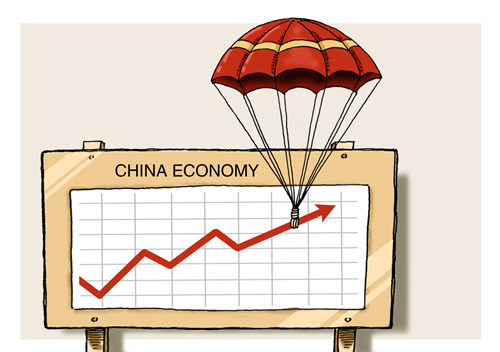Quality of economic growth matters
- By Ma Guangyuan
 0 Comment(s)
0 Comment(s) Print
Print E-mail China.org.cn, April 29, 2012
E-mail China.org.cn, April 29, 2012
In the first quarter of 2012,China's economy saw its lowest GDP growth rate since the second quarter of 2009 at 8.1 percent, which is much lower than most analysts' expectations of 8.3 percent growth.
|
|
|
Bamboo chutes of recovery [By Zhai Haijun/China.org.cn] |
Although this sounds like bad news for China's economy, in fact, views on how to analyze the country's GDP growth rate are quite divergent.
Macroeconomic data in the first quarter pointed to a bleaker than expected economic climate - a decline in industrial added value, negative growth local government revenues, a 5.2 percent decline in the profits of industrial ventures, obvious decline in real estate investment in some places, a large scale slowdown in import and export growth rates, and the lowest growth rate in investment in the same period since 2004.
However, considering the complicated situation both at home and abroad facing China's economy, 8.1 percent growth should be considered an excellent achievement in terms of GDP growth rate.
"Generally speaking, China's economy is fundamentally healthy and the economic growth rate has stayed in a reasonable range; there is great potential for economic development and enough room for macro-control policies," the Executive meeting of the State Council, China's cabinet, on April 14 said in a statement in response to the economic news. The statement also emphasized on "adhering to the real estate regulation and control policy".
The government's statement is not good news for those who had been hoping for an increase in government stimulus programs and a relaxing of real estate controls.
Actually too much emphasis on the rate of economic growth have done a lot of harm to China's economy.
We have to understand that China's economy is confronted with unprecedented difficulties and challenges as it adjusts its methods of development and economic structure. These difficulties include the imbalance of the economic structure due to rapid development, the weakening of the real economy by the real estate bubble, difficulties in financing and competition for SMEs due to policies inclined towards larger state owned enterprises, and insufficient domestic demand.
Stimulus programs and relaxing of real estate controls, which may lead to cheerful short-term boosts to GDP growth, will not solve the problems facing the real economy and the long-term development of SMEs.
Therefore, in addition to all the changes the Chinese economy must endure, including strengthening tax reduction efforts, stimulating public investment, expending domestic demand and deepening reform, first and foremost we must let GDP growth slow down and put our focus on the quality of growth.
Quality economic growth will benefit more people and promote increases in social welfare which are critical to China's future.
The author is a PhD in economics and researcher with the Chinese Academy of Social Sciences.
(This article was first published in Chinese and translated by Guo Jiali.)
Opinion articles reflect the views of their authors, not necessarily those of China.org.cn.







Go to Forum >>0 Comment(s)